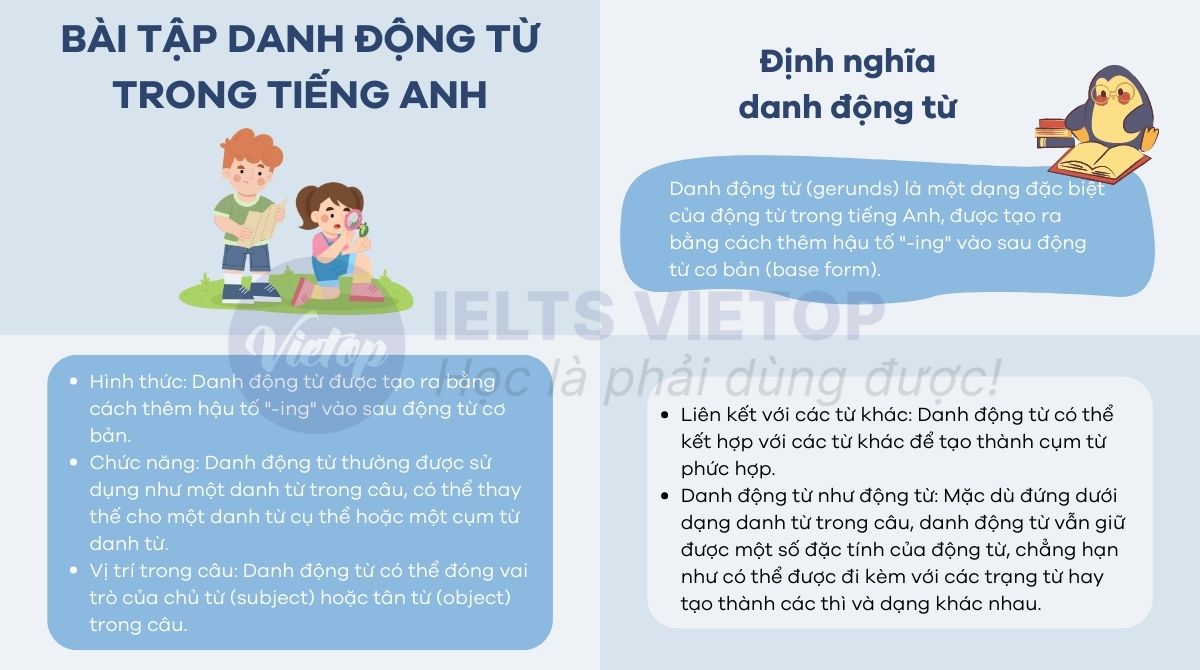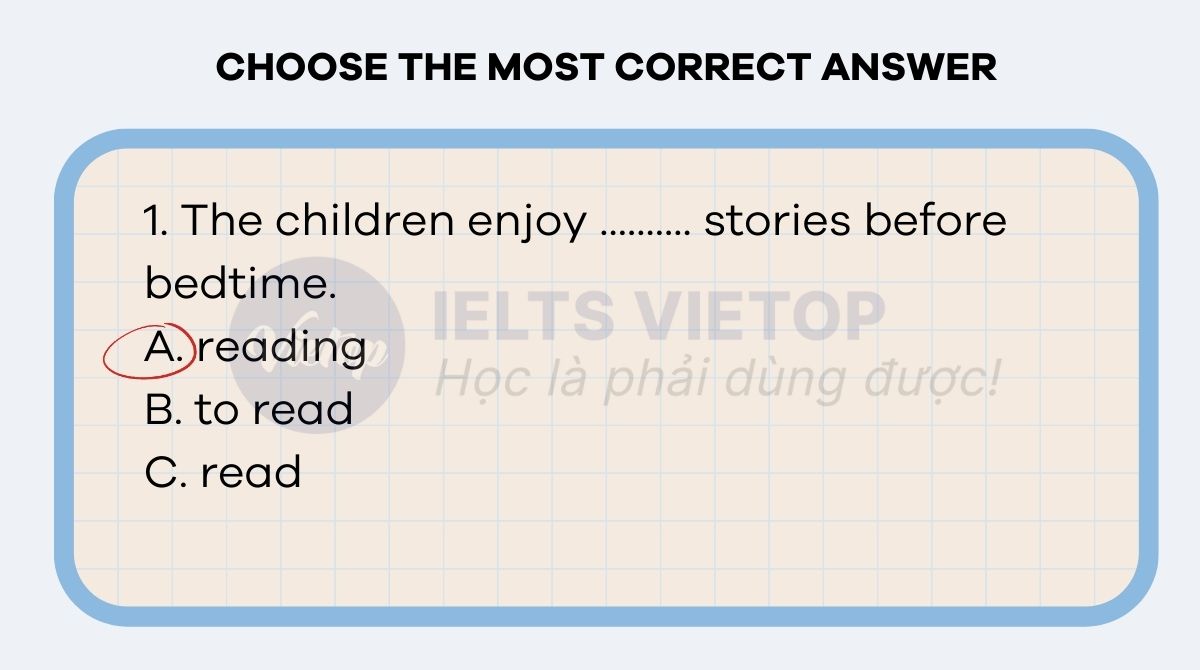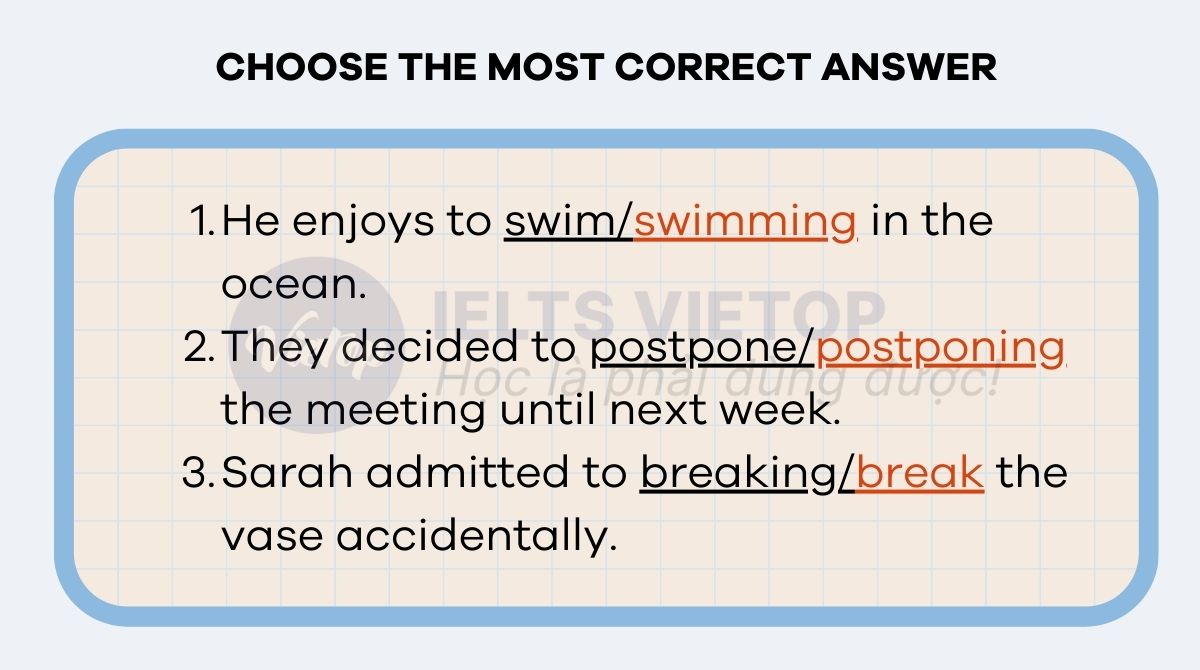Chắc chắn rằng việc sử dụng động từ một cách chính xác và linh hoạt là chìa khóa quan trọng trong việc thành thạo tiếng Anh, đặc biệt là phần danh động từ. Mình đã từng gặp phải những khó khăn trong việc nhận biết các loại danh động từ và sử dụng chúng trong các tình huống khác nhau.
Để giúp bạn vượt qua những thách thức này, mình đã tổng hợp và giới thiệu đến bạn trọn bộ bài tập danh động từ trong tiếng Anh, cung cấp kèm theo đáp án chi tiết. Bài tập này không chỉ giúp bạn rèn luyện kỹ năng ngôn ngữ mà còn giúp bạn hiểu rõ hơn về cách các danh động từ hoạt động trong ngữ cảnh thực tế.
Dưới đây là những vấn đề cần bạn tìm hiểu để đạt được điểm số cao:
- Ôn tập kiến thức về lý thuyết danh động từ trong tiếng Anh.
- Làm quen với các dạng bài tập phổ biến của danh động từ trong tiếng Anh.
- Ghi nhớ các lưu ý và mẹo quan trọng để hoàn thành các bài tập.
Cùng bắt đầu ngay nào!
1. Ôn tập lý thuyết danh động từ trong tiếng Anh
Trước khi chúng ta bắt đầu làm bài tập, hãy cùng nhau ôn lại phần kiến thức ngữ pháp về danh động từ trong tiếng Anh:
| 1. Định nghĩa Danh động từ (gerunds) là một dạng đặc biệt của động từ trong tiếng Anh, được tạo ra bằng cách thêm hậu tố -ing vào sau động từ cơ bản (base form). 2. Đặc điểm – Hình thức: Danh động từ được tạo ra bằng cách thêm hậu tố -ing vào sau động từ cơ bản. E.x.: Play (chơi) thành playing (việc chơi), read (đọc) thành reading (việc đọc). – Chức năng: Danh động từ thường được sử dụng như một danh từ trong câu, có thể thay thế cho một danh từ cụ thể hoặc một cụm danh từ. E.x.: I enjoy swimming. (Tôi thích bơi.) => Ở đây, swimming được sử dụng như một danh động từ thay thế cho một danh từ hoặc cụm danh từ như the activity of swimming (hoạt động bơi). – Vị trí trong câu: Danh động từ có thể đóng vai trò của chủ từ (subject) hoặc tân từ (object) trong câu. E.x.: Swimming is good exercise. (Việc bơi là một bài tập tốt.) => Trong câu này, swimming đóng vai trò của chủ từ. – Liên kết với các từ khác: Danh động từ có thể kết hợp với các từ khác để tạo thành cụm từ phức hợp. E.x.: She is interested in swimming. (Cô ấy quan tâm đến việc bơi.) => Ở đây, “in swimming” là một cụm từ bổ nghĩa cho động từ “interested”. – Danh động từ như động từ: Mặc dù đứng dưới dạng danh từ trong câu, danh động từ vẫn giữ được một số đặc tính của động từ, chẳng hạn như có thể được đi kèm với các trạng từ hay tạo thành các thì và dạng khác nhau. E.x.: She enjoys swimming quickly. (Cô ấy thích bơi nhanh.) => Ở đây, “quickly” là một trạng từ đi cùng với danh động từ “swimming”. |
Để có hiểu thêm về danh động từ trong tiếng Anh, bạn có thể xem thêm lý thuyết của ngữ pháp này qua đường dẫn bên dưới:
Xem thêm:
- Nắm trọn danh động từ hoàn thành (perfect gerund) – Chinh phục 6.5 IELTS
- 150+ bài tập danh từ số ít và danh từ số nhiều có đáp án
- Bài tập về danh từ và cụm danh từ từ cơ bản đến nâng cao

Nhận tư vấn miễn phí khóa học hè
2. Bài tập danh động từ trong tiếng Anh
Trong phần tiếp theo, bạn sẽ tìm thấy hơn 100 câu bài tập về danh động từ trong tiếng Anh mà mình tổng hợp từ những nguồn đáng tin cậy. Những bài tập này sẽ giúp bạn rèn luyện và nắm vững kiến thức, cũng như cải thiện khả năng sử dụng chúng trong giao tiếp.
Một số dạng bài tập trong file này bao gồm:
- Trắc nghiệm chọn đáp án đúng A, B, C.
- Điền dạng đúng của từ trong ngoặc.
- Chọn dạng đúng của động từ trong câu.
- Chia động từ trong ngoặc để hoàn thành đoạn văn.

Exercise 1: Fill in the correct form of the word in parentheses
(Bài tập 1: Điền dạng đúng của từ trong ngoặc)
- She enjoys (read) ………. books in her free time.
- They practiced (sing) ………. together before the performance.
- I suggest (visit) ………. the museum while you’re in town.
- He admitted (cheat) ………. on the test.
- We’re considering (take) ………. a trip to the mountains next weekend.
- Have you ever thought about (learn) ………. a new language?
- She avoids (eat) ………. junk food for better health.
- They discussed (start) ………. a new business venture.
- Are you interested in (join) ………. the club?
- He apologized for (arrive) ………. late to the meeting.
Exercise 2: Choose the correct answer
(Bài tập 2: Chọn đáp án đúng)

1. The children enjoy ………. stories before bedtime.
- A. reading
- B. to read
- C. read
2. She avoids ………. out late at night alone.
- A. go
- B. going
- C. to go
3. We discussed the possibility of ………. a trip to Europe next summer.
- A. take
- B. taking
- C. to take
4. He admitted ………. the wrong decision.
- A. making
- B. to make
- C. make
5. Sarah regrets ………. the party early.
- A. leaving
- B. to leave
- C. leave
6. They considered ………. a new car, but decided to repair the old one instead.
- A. buy
- B. buying
- C. to buy
7. He suggested ………. a picnic in the park.
- A. having
- B. to have
- C. have
8. I can’t imagine ………. without my best friend.
- A. live
- B. living
- C. to live
9. They discussed the possibility of ………. the project deadline.
- A. extend
- B. extending
- C. to extend
10. She insisted on ………. the bill for dinner.
- A. pay
- B. to pay
- C. paying
Exercise 3: Choose the most correct answer
(Bài tập 3: Chọn đáp án đúng nhất)

- He enjoys to swim/swimming in the ocean.
- They decided to postpone/postponing the meeting until next week.
- Sarah admitted to breaking/break the vase accidentally.
- We discussed to implement/implementing the new policy immediately.
- He avoided to answer/answering the difficult question during the interview.
- She suggested to go/going out for dinner tonight.
- They considered to move/moving to a new city for better job opportunities.
- He practiced to play/playing the guitar every day to improve his skills.
- The teacher encouraged to participate/participating in the science fair.
- I’m looking forward to seeing/seeing the new movie this weekend.
Exercise 4: Change the verbs to gerunds
(Bài tập 4: Chuyển động từ sang dạng danh động từ)
- Work ⇒ ……….
- Relax ⇒ ……….
- Go ⇒ ……….
- Write ⇒ ……….
- Bathe ⇒ ……….
- Cut ⇒ ……….
- Leave ⇒ ……….
- Forget ⇒ ……….
- Ride ⇒ ……….
- Study ⇒ ……….
- Die ⇒ ……….
- See ⇒ ……….
- Clean ⇒ ……….
- Drive ⇒……….
- Chat ⇒ ……….
- Make ⇒ ……….
- Learn ⇒ ……….
- Be ⇒ ……….
- Slip ⇒ ……….
- Steal ⇒ ……….
Xem thêm:
- 199+ bài tập về danh từ đếm được và danh từ không đếm được
- Bài tập ngữ pháp tiếng Anh có đáp án từ cơ bản đến nâng cao
- Bài tập so sánh trong tiếng Anh nâng cao có đáp án
3. Download tổng hợp bài tập danh động từ trong tiếng Anh
Để thực hành các bài tập kèm đáp án về danh động từ trong tiếng Anh một cách hiệu quả, bạn có thể tải về toàn bộ câu hỏi ôn tập, với hơn 100 câu hỏi. Đây là nguồn tài liệu đầy đủ, sẽ giúp bạn củng cố danh động từ trong tiếng Anh và làm quen với cấu trúc thường gặp trong các kỳ thi sắp tới.
Để sở hữu trọn bộ bài tập về danh động từ trong tiếng Anh này, hãy bấm vào liên kết dưới đây và bắt đầu hành trình rèn luyện kỹ năng ngôn ngữ của bạn ngay hôm nay!
4. Lời kết
Bằng cách rèn luyện và thực hành với các bài tập danh động từ, bạn có thể củng cố kỹ năng này và trở nên thành thạo hơn trong việc sử dụng danh động từ.
Hy vọng rằng bộ tài liệu này đã mang lại cho bạn những kiến thức hữu ích và sự tự tin khi tiếp cận với ngữ pháp tiếng Anh này. Để đảm bảo rằng các bạn sẽ tránh được những lỗi sai liên quan tới danh động từ trong tiếng Anh, thì mình sẽ chỉ ra 03 điểm trọng tâm sau đây:
- Để hiểu và sử dụng đúng danh động từ, bạn cần biết cách tạo hình thức này từ động từ cơ bản. Hậu tố “-ing” được thêm vào sau động từ cơ bản để tạo thành danh động từ.
- Danh động từ thường được sử dụng như một danh từ trong câu, thường đóng vai trò của chủ từ (subject) hoặc tân từ (object). Chúng có thể thay thế cho một danh từ cụ thể hoặc một cụm danh từ.
- Danh động từ có thể được sử dụng trong nhiều trường hợp khác nhau trong câu, cũng như kết hợp với các từ và cụm từ khác để tạo thành các cấu trúc phức tạp hơn. Điều này bao gồm việc sử dụng chúng trong các cấu trúc thì khác nhau, cũng như trong các cụm động từ.
Hãy thực hành mà không xem đáp án trước, sau đó tự kiểm tra và ghi lại những phần bạn sai. Phương pháp này giúp ghi nhớ kiến thức và tránh lặp lại những lỗi.
Nếu còn bất kỳ thắc mắc về bài tập nào, hãy để lại câu hỏi tại phần bình luận. Mình và đội ngũ giáo viên tại IELTS Vietop luôn sẵn sàng giải đáp mọi vấn đề cho bạn.
Đừng quên khám phá thêm nhiều tài liệu ngữ pháp hữu ích khác tại chuyên mục IELTS Grammar của IELTS Vietop. Chúc bạn thành công trong việc chuẩn bị cho kỳ thi IELTS của mình!
Tài liệu tham khảo:
What Is a Gerund? Gerund Definition and Examples: https://www.grammarly.com/blog/gerund/ – Truy cập ngày 16/4/2024











